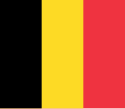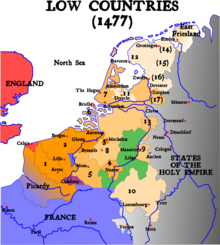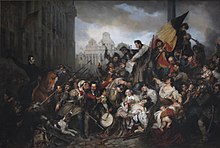This is an old revision of this page, as edited by Wester (talk | contribs) at 10:38, 30 April 2012 (misleading). The present address (URL) is a permanent link to this revision, which may differ significantly from the current revision.
Revision as of 10:38, 30 April 2012 by Wester (talk | contribs) (misleading)(diff) ← Previous revision | Latest revision (diff) | Newer revision → (diff) This article is about the country. For other uses, see Belgium (disambiguation). "Belgian" redirects here. For the article on the people, see Belgians.| Kingdom of Belgium | |
|---|---|
 Flag
Flag
 Coat of arms
Coat of arms
| |
| Motto: Eendracht maakt macht (Dutch) L'union fait la force (French) Einigkeit macht Stark (German) "Strength through Unity" (lit. "Unity makes strength") | |
| Anthem: The "Brabançonne" instrumental version: | |
 Location of Belgium (dark green) Location of Belgium (dark green)– in Europe (green & dark grey) | |
| Capital | Brussels |
| Largest metropolitan area | Brussels |
| Official languages | Dutch French German |
| Demonym(s) | Belgian |
| Government | Federal parliamentary constitutional monarchy |
| • King | Albert II |
| • Prime Minister | Elio Di Rupo |
| Legislature | Federal Parliament |
| • Upper house | Senate |
| • Lower house | Chamber of Representatives |
| Independence | |
| • Declared from the Netherlands | 4 October 1830 |
| • Recognised | 19 April 1839 |
| Area | |
| • Total | 30,528 km (11,787 sq mi) (139th) |
| • Water (%) | 6.4 |
| Population | |
| • 2011 estimate | 11,007,020 (76th) |
| • 2001 census | 10,296,350 |
| • Density | 354.7/km (918.7/sq mi) (33rd) |
| GDP (PPP) | 2011 estimate |
| • Total | $413.281 billion (30th) |
| • Per capita | $37,736 (20th) |
| GDP (nominal) | 2011 estimate |
| • Total | $513.396 billion (21st) |
| • Per capita | $46,878 (16th) |
| Gini (2005) | 28 Error: Invalid Gini value |
| HDI (2011) | Error: Invalid HDI value (18th) |
| Currency | Euro (€) (EUR) |
| Time zone | UTC+1 (CET) |
| • Summer (DST) | UTC+2 (CEST) |
| Drives on | Right |
| Calling code | 32 |
| ISO 3166 code | BE |
| Internet TLD | .be |
| |
Belgium (/ˈbɛldʒəm/ BEL-jəm), officially the Kingdom of Belgium, is a federal state in Western Europe. It is a founding member of the European Union and hosts the EU's headquarters, and those of several other major international organisations such as NATO. Belgium covers an area of 30,528 square kilometres (11,787 sq mi), and it has a population of about 11 million people. Straddling the cultural boundary between Germanic and Latin Europe, Belgium is home to two main linguistic groups, the Dutch-speakers, mostly Flemish (about 60%), and the French-speakers, mostly Walloons (about 40%), plus a small group of German-speakers. Belgium's two largest regions are the Dutch-speaking region of Flanders in the north and the French-speaking southern region of Wallonia. The Brussels-Capital Region, officially bilingual, is a mostly French-speaking enclave within the Flemish Region. A German-speaking Community exists in eastern Wallonia. Belgium's linguistic diversity and related political conflicts are reflected in the political history and a complex system of government.
Historically, Belgium, the Netherlands and Luxembourg were known as the Low Countries, which used to cover a somewhat larger area than the current Benelux group of states. The region was called Belgica in Latin because of the Roman province Gallia Belgica which covered more or less the same area. From the end of the Middle Ages until the 17th century, it was a prosperous centre of commerce and culture. From the 16th century until the Belgian Revolution in 1830, when Belgium seceded from the Netherlands, many battles between European powers were fought in the area of Belgium, causing it to be dubbed the battleground of Europe, a reputation strengthened by both World Wars.
Upon its independence, Belgium participated in the Industrial Revolution and, during the course of the 20th century, possessed a number of colonies in Africa. The second half of the 20th century was marked by the rise of contrasts between the Flemish and the Francophones fuelled by differences of language and the unequal economic development of Flanders and Wallonia. This ongoing antagonism has caused far-reaching reforms, changing the formerly unitary Belgian state into a federal state, and a long period of political instability.
History
Main article: History of Belgium
The name 'Belgium' is derived from Gallia Belgica, a Roman province in the northernmost part of Gaul that, before Roman invasion in 100 BC, was inhabited by the Belgae, a mix of Celtic and Germanic peoples. A gradual immigration by Germanic Frankish tribes during the 5th century brought the area under the rule of the Merovingian kings. A gradual shift of power during the 8th century led the kingdom of the Franks to evolve into the Carolingian Empire. The Treaty of Verdun in 843 divided the region into Middle and West Francia and therefore into a set of more or less independent fiefdoms which, during the Middle Ages, were vassals either of the King of France or of the Holy Roman Emperor.
Many of these fiefdoms were united in the Burgundian Netherlands of the 14th and 15th centuries. Emperor Charles V extended the personal union of the Seventeen Provinces in the 1540s, making it far more than a personal union by the Pragmatic Sanction of 1549 and increased his influence over the Prince-Bishopric of Liège. The Eighty Years' War (1568–1648) divided the Low Countries into the northern United Provinces (Belgica Foederata in Latin, the "Federated Netherlands") and the Southern Netherlands (Belgica Regia, the "Royal Netherlands"). The latter were ruled successively by the Spanish and the Austrian Habsburgs and comprised most of modern Belgium. This was the theatre of most Franco-Spanish and Franco-Austrian wars during the 17th and 18th centuries. Following the campaigns of 1794 in the French Revolutionary Wars, the Low Countries—including territories that were never nominally under Habsburg rule, such as the Prince-Bishopric of Liège—were annexed by the French First Republic, ending Austrian rule in the region. The reunification of the Low Countries as the United Kingdom of the Netherlands occurred at the dissolution of the First French Empire in 1815.
The 1830 Belgian Revolution led to the establishment of a Catholic and bourgeois, officially French-speaking and neutral, independent Belgium under a provisional government and a national congress. Since the installation of Leopold I as king on 21 July 1831 (which is now celebrated as Belgium's National Day), Belgium has been a constitutional monarchy and parliamentary democracy, with a laicist constitution based on the Napoleonic code. Although the franchise was initially restricted, universal suffrage for men was introduced after the general strike of 1893 (with plural voting until 1919) and for women in 1949.

The main political parties of the 19th century were the Catholic Party and the Liberal Party, with the Belgian Labour Party emerging towards the end of the 19th century. French was originally the single official language adopted by the nobility and the bourgeoisie. It progressively lost its overall importance as Dutch became recognised as well. This recognition became official in 1898 and in 1967 a Dutch version of the Constitution was legally accepted.
The Berlin Conference of 1885 ceded control of the Congo Free State to King Leopold II as his private possession. From around 1900 there was growing international concern for the extreme and savage treatment of the Congolese population under Leopold II, for whom the Congo was primarily a source of revenue from ivory and rubber production. In 1908 this outcry led the Belgian state to assume responsibility for the government of the colony, henceforth called the Belgian Congo. Germany invaded Belgium in 1914 as part of the Schlieffen Plan and much of the Western Front fighting of World War I occurred in western parts of the country. The opening months of the war were known as the Rape of Belgium due to German atrocities. Belgium took over the German colonies of Ruanda-Urundi (modern day Rwanda and Burundi) during the war, and they were mandated to Belgium in 1924 by the League of Nations. In the aftermath of the First World War, the Prussian districts of Eupen and Malmedy were annexed by Belgium in 1925, thereby causing the presence of a German-speaking minority.
The country was again invaded by Germany in 1940 and was occupied until its liberation by the Allies in 1944. After World War II, a general strike forced king Leopold III, who many saw as collaborating with the Germans during the war, to abdicate in 1951. The Belgian Congo gained independence in 1960 during the Congo Crisis; Ruanda-Urundi followed with
- "Government type: Belgium". The World Factbook. CIA. Retrieved 19 December 2011.
- "Total population as of January". Eurostat. Retrieved 9 February 2010.
- Cite error: The named reference
statbel2was invoked but never defined (see the help page). - ^ "Belgium". International Monetary Fund. Retrieved 17 April 2012.
- "Distribution of family income – Gini index". The World Factbook. CIA. Retrieved 1 September 2009.
- "Human Development Report 2011" (PDF). United Nations. Retrieved 2 November 2011.
-
Leclerc, Jacques, , membre associé du TLFQ (18 January 2007). "Belgique • België • Belgien—Région de Bruxelles-Capitale • Brussels Hoofdstedelijk Gewest". L'aménagement linguistique dans le monde (in French). Host: Trésor de la langue française au Québec (TLFQ), Université Laval, Quebec. Retrieved 18 June 2007.
C'est une région officiellement bilingue formant au centre du pays une enclave dans la province du Brabant flamand (Vlaams Brabant)
{{cite web}}: CS1 maint: multiple names: authors list (link)
* "About Belgium". Belgian Federal Public Service (ministry) / Embassy of Belgium in the Republic of Korea. Retrieved 21 June 2007.the Brussels-Capital Region is an enclave of 162 km within the Flemish region.
* "Flanders (administrative region)". Microsoft Encarta Online Encyclopedia. Microsoft. 2007. Archived from the original on 31 October 2009. Retrieved 21 June 2007.The capital of Belgium, Brussels, is an enclave within Flanders.
{{cite web}}: Unknown parameter|deadurl=ignored (|url-status=suggested) (help)
* McMillan, Eric (1999). "The FIT Invasions of Mons" (PDF). Capital translator, Newsletter of the NCATA, Vol. 21, No. 7, p. 1. National Capital Area Chapter of the American Translators Association (NCATA). Retrieved 21 June 2007.The country is divided into three autonomous regions: Dutch-speaking Flanders in the north; mostly French-speaking Brussels in the center as an enclave within Flanders and French-speaking Wallonia in the south, including the German-speaking Cantons de l'Est).
{{cite web}}: Unknown parameter|month=ignored (help)
* Van de Walle, Steven, lecturer at University of Birmingham Institute of Local Government Studies, School of Public Policy. "Language Facilities in the Brussels Periphery". KULeuven—Leuvens Universitair Dienstencentrum voor Informatica en Telematica. Archived from the original (PDF) on 31 October 2009. Retrieved 21 June 2007.Brussels is a kind of enclave within Flanders—it has no direct link with Wallonia.
{{cite web}}:|author=has generic name (help); External link in|author=|deadurl=ignored (|url-status=suggested) (help)CS1 maint: multiple names: authors list (link) CS1 maint: numeric names: authors list (link) - "The German-speaking Community". The German-speaking Community. Retrieved 5 May 2007. The (original) version in German language (already) mentions 73,000 instead of 71,500 inhabitants.
- Morris, Chris (13 May 2005). "Language dispute divides Belgium". BBC News. Retrieved 8 May 2007.
-
Petermann, Simon, Professor at the University of Liège, Wallonia, Belgium—at colloquium IX Sommet de la francophonie—Initiatives 2001—Ethique et nouvelles technologies, session 6 Cultures et langues, la place des minorités, Bayreuth (25 September 2001). "Langues majoritaires, langues minoritaires, dialectes et NTIC" (in French). Retrieved 4 May 2007.
{{cite web}}: CS1 maint: multiple names: authors list (link) CS1 maint: numeric names: authors list (link) -
Haß, Torsten, Head of the Fachhochschule (University of Applied Sciences) of Kehl Library, Kehl, Germany (17 February 2003). "Rezension zu (Review of) Cook, Bernard: Belgium. A History ISBN 0-8204-5824-4" (in German). FH-Zeitung (journal of the Fachhochschule). Archived from the original on 9 June 2007. Retrieved 24 May 2007.
die Bezeichnung Belgiens als „the cockpit of Europe" (James Howell, 1640), die damals noch auf eine kriegerische Hahnenkampf-Arena hindeutete
{{cite web}}: Check|author=value (help)CS1 maint: multiple names: authors list (link)—The book reviewer, Haß, attributes the expression in English to James Howell in 1640. Howell's original phrase "the cockpit of Christendom" became modified afterwards, as shown by:
* Carmont, John. "The Hydra No.1 New Series (November 1917)—Arras And Captain Satan". War Poets Collection. Napier University's Business School. Retrieved 24 May 2007.—and as such coined for Belgium:
* Wood, James (1907). "Nuttall Encyclopaedia of General Knowledge—Cockpit of Europe". Retrieved 24 May 2007.Cockpit of Europe, Belgium, as the scene of so many battles between the Powers of Europe.
(See also The Nuttall Encyclopaedia) -
Fitzmaurice, John, at the Secretariat-General of the European Commission, taught at the Université Libre de Bruxelles (1996). "New Order? International models of peace and reconciliation—Diversity and civil society". Democratic Dialogue Northern Ireland's first think tank, Belfast, Northern Ireland, UK. Retrieved 12 August 2007.
{{cite web}}: External link in|author=|publisher=(help)CS1 maint: multiple names: authors list (link) CS1 maint: numeric names: authors list (link) - "Belgium country profile". EUbusiness, Richmond, UK. 27 August 2006. Retrieved 12 August 2007.
-
Karl, Farah (text); Stoneking, James (course) (1999). "Chapter 27. The Age of Imperialism (Section 2. The Partition of Africa)" (PDF). World History II. Appomattox Regional Governor's School (History Department), Petersburg, Virginia, USA. Archived from the original (PDF) on 25 September 2007. Retrieved 16 August 2007.
{{cite web}}: CS1 maint: multiple names: authors list (link) - Bryant, Elizabeth (12 October 2007). "Divisions could lead to a partition in Belgium". San Francisco Chronicle. Retrieved 28 May 2008.
- Dominic Hughes (15 July 2008). "Analysis: Where now for Belgium?". BBC News. Retrieved 16 July 2008.
- Banks, Martin (6 September 2010). "Fears over 'break up' of Belgium". The Daily Telegraph. UK. Retrieved 6 September 2010.
-
Bunson, Matthew (1994). Encyclopedia of the Roman Empire (Hardcover 352pp ed.). Facts on File, New York. p. 169. ISBN 081602135X Paperback 512pp, ISBN 0-8160-3182-7; Revised edition (2002), Hardcover 636pp, ISBN 0-8160-4562-3.
{{cite book}}: Check|isbn=value: invalid character (help) -
Footnote: The Celtic and/or Germanic influences on and origin(s) of the Belgae remains disputed. Further reading e.g.
Witt, Constanze Maria (1997). "Ethnic and Cultural Identity". Barbarians on the Greek Periphery?—Origins of Celtic Art. Institute for Advanced Technology in the Humanities, University of Virginia. Retrieved 6 June 2007.
{{cite web}}: Unknown parameter|month=ignored (help) - ^ Cook (2002), p. 3
- Edmundson, George (1922). "Chapter I: The Burgundian Netherlands". History of Holland. The University Press, Cambridge. Republished: Authorama. Retrieved 15 December 2010.
- Edmundson, George (1922). "Chapter II: Habsburg Rule in the Netherlands". History of Holland. The University Press, Cambridge. Republished: Authorama. Retrieved 9 June 2007.
-
Dobbelaere, Karel (Katholieke Universiteit Leuven); Voyé, Liliane (Université Catholique de Louvain) (1990). "From Pillar to Postmodernity: The Changing Situation of Religion in Belgium" (PDF). (The Allen Review). Online at Oxford Journals, Oxford University Press: S1. Retrieved 25 February 2011.
{{cite journal}}: Cite journal requires|journal=(help); External link in|publisher= - Gooch, Brison Dowling (1963). Belgium and the February Revolution. Martinus Nijhoff Publishers, The Hague, Netherlands. p. 112. Retrieved 18 October 2010.
- "National Day and feast days of Communities and Regions". Belgian Federal Government. Retrieved 20 July 2011.
-
Kris Deschouwer (2004). "Ethnic structure, inequality and governance of the public sector in Belgium" (PDF). United Nations Research Institute for Social Development (UNRISD). Retrieved 22 May 2007.
{{cite web}}: External link in|author=|month=ignored (help)CS1 maint: numeric names: authors list (link) - Meredith, Mark (6 June 2005). The State of Africa (Hardcover 608pp ed.). Free Press. pp. 95–96(?). ISBN 0-7432-3221-6.
- "The Congolese Civil War 1960–1964". BBC News. Retrieved 29 April 2010.
Cite error: There are <ref group=nb> tags on this page, but the references will not show without a {{reflist|group=nb}} template (see the help page).